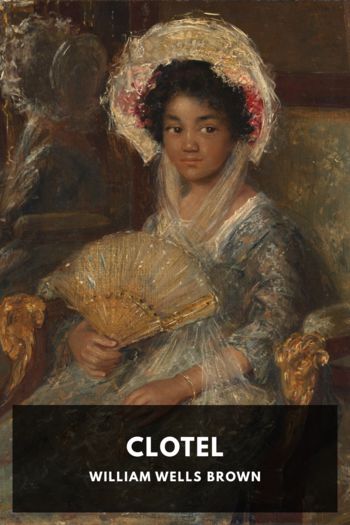Clotel - William Wells Brown (good books to read for beginners txt) 📗

- Author: William Wells Brown
Book online «Clotel - William Wells Brown (good books to read for beginners txt) 📗». Author William Wells Brown
“We, as individuals, are fast losing our reputation for honest dealing. Our nation is losing its character. The loss of a firm national character, or the degradation of a nation’s honour, is the inevitable prelude to her destruction. Behold the once proud fabric of a Roman empire—an empire carrying its arts and arms into every part of the Eastern continent; the monarchs of mighty kingdoms dragged at the wheels of her triumphal chariots; her eagle waving over the ruins of desolated countries; where is her splendour, her wealth, her power, her glory? Extinguished forever. Her mouldering temples, the mournful vestiges of her former grandeur, afford a shelter to her muttering monks. Where are her statesmen, her sages, her philosophers, her orators, generals? Go to their solitary tombs and inquire. She lost her national character, and her destruction followed. The ramparts of her national pride were broken down, and Vandalism desolated her classic fields. Then let the people of our country take warning ere it is too late. But most of us say to ourselves,
‘Who questions the right of mankind to be free?
Yet, what are the rights of the negro to me?
I’m well fed and clothed, I have plenty of pelf—
I’ll care for the blacks when I turn black myself.’
“New Orleans is doubtless the most immoral place in the United States. The theatres are open on the Sabbath. Bullfights, horse-racing, and other cruel amusements are carried on in this city to an extent unknown in any other part of the Union. The most stringent laws have been passed in that city against negroes, yet a few years since the State Legislature passed a special act to enable a white man to marry a coloured woman, on account of her being possessed of a large fortune. And, very recently, the following paragraph appeared in the city papers:
There has been quite a stir recently in this city, in consequence of a marriage of a white man, named Buddington, a teller in the Canal Bank, to the negro daughter of one of the wealthiest merchants. Buddington, before he could be married, was obliged to swear that he had negro blood in his veins, and to do this he made an incision in his arm, and put some of her blood in the cut. The ceremony was performed by a Catholic clergyman, and the bridegroom has received with his wife a fortune of fifty or sixty thousand dollars.
“It seems that the fifty or sixty thousand dollars entirely covered the negro woman’s black skin, and the law prohibiting marriage between blacks and whites was laid aside for the occasion.”
Althesa felt proud, as well she might, at her husband’s taking such high ground in a slaveholding city like New Orleans.
XXI The Christian’s DeathO weep, ye friends of freedom weep!
Your harps to mournful measures sweep.
On the last day of November, 1620, on the confines of the Grand Bank of Newfoundland, lo! we behold one little solitary tempest-tost and weather-beaten ship; it is all that can be seen on the length and breadth of the vast intervening solitudes, from the melancholy wilds of Labrador and New England’s ironbound shores, to the western coasts of Ireland and the rock-defended Hebrides, but one lonely ship greets the eye of angels or of men, on this great throughfare of nations in our age. Next in moral grandeur was this ship, to the great discoverer’s: Columbus found a continent; the Mayflower brought the seedwheat of states and empire. That is the Mayflower, with its servants of the living God, their wives and little ones, hastening to lay the foundations of nations in the accidental lands of the setting-sun. Hear the voice of prayer to God for his protection, and the glorious music of praise, as it breaks into the wild tempest of the mighty deep, upon the ear of God. Here in this ship are great and good men. Justice, mercy, humanity, respect for the rights of all; each man honoured, as he was useful to himself and others; labour respected, law-abiding men, constitution-making and respecting men; men whom no tyrant could conquer, or hardship overcome, with the high commission sealed by a Spirit divine, to establish religious and political liberty for all. This ship had the embryo elements of all that is useful, great, and grand in Northern institutions; it was the great type of goodness and wisdom, illustrated in two and a quarter centuries gone by; it was the good genius of America.
But look far in the Southeast, and you behold on the same day in 1620, a low rakish ship hastening from the tropics, solitary and alone, to the New World. What is she? She is freighted with the elements of unmixed evil. Hark! hear those rattling chains, hear that cry of despair and wail of anguish, as they die away in the unpitying distance. Listen to those shocking oaths, the crack of that flesh-cutting whip. Ah! it is the first cargo of slaves on their way to Jamestown, Virginia. Behold the Mayflower anchored at Plymouth Rock, the slave-ship in James River. Each a parent, one of the prosperous, labour-honouring, law-sustaining institutions of the North; the other the mother of slavery, idleness, lynch-law, ignorance, unpaid labour, poverty, and duelling, despotism, the ceaseless swing of the whip, and the peculiar institutions of the South. These ships are the representation of good and evil in the New World, even to our day.





Comments (0)